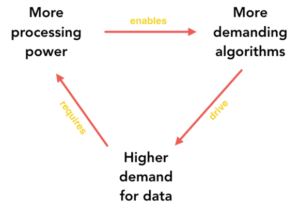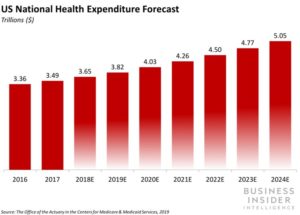Medical Lockbox
Moore’s Law famously states that the number of transistors on a microchip doubles every two years, though the cost of computers is halved. A new essay on Medium.com explores how Moore’s Law had actually been “phasing out” for a period of time: Moore’s Law, one of the fundamental laws indicating the exponential progress in the…
Read MoreThe Office of the National Coordinator for Health IT’s (ONC’s) has issued guidelines for adopting application programming interfaces (APIs) into health data and EHR use. (You can see their report on hospitals’ usage of EHR data here.) The organizations who signed on to the letter are: American Academy of Family Physicians American Academy of Neurology…
Read MoreModern insurance plans — and, indeed, cases where people remain un- or under-insured — mean that whenever possible, healthcare consumers want to be able to anticipate potential costs as accurately as possible. This is the dawn of “retail healthcare” when it comes to certain anticipated, nonemergency cases, and consumers have a growing array of resources…
Read MoreThe US healthcare payments market is gigantic, and getting bigger. As seen in the chart above, Healthcare expenditure hit $3.65 trillion in 2018 (per projections from CMS) and this spending is only expected to go up and up (again, as seen in the ski-jump above). Does that mean cruise control for players in the healthcare…
Read MoreMedical processes — from intake to discharge and billing — benefit from both information-gathering and information-sharing. The industry is getting better and better at proliferating patient information where it is needed in order to assure proper assessment, treatment, and billing. And, as many of you know, The U.S. Department of Health and Human Services (HHS)…
Read MoreFrom Hospital CFO Report comes words of wisdom from seven industry RCM leaders. The common threads? Heightened communication, empowerment of staff, and, of course, technology adoption and AI/machine learning. Check them out and see if any strike a chord with you and your organization! In the meantime, Fierce Healthcare points out that AI and blockchain…
Read MoreOrboGraph’s development and deployment of our own Artificial Intelligence and Deep Learning technologies called OrbNetAI and this year’s OrboGraph Technology Conference theme — 2019: The Year of AI and Modernization — make it clear that we are no strangers to the new frontiers opened up by Artificial Intelligence and Machine Learning technologies in our sector.…
Read MoreCNBC reports that J.P. Morgan is paying more than $500 million for the medical payments technology firm InstaMed, a bold move into the $3.5 trillion market for U.S. health-care spending. It is the lender’s largest takeover since buying Bear Stearns and the bank assets of Washington Mutual in 2008, according to people with knowledge of…
Read MoreHealthcareDive takes a look at changes and trends it anticipates in the coming year, mainly due to political ripples from Washington (for instance, a judge’s declaration that the Affordable Care Act is no longer constitutional) and emerging consumer preferences. Their snapshot of a few big trends for the payer and provider crowds to watch for…
Read MoreHealthCareDive reports on a Connance survey revealing that 70% of providers claim it takes more than a month to collect from patients, and a 2017 Advisory Board analysis found that the average 350-bed hospital lost up to $22 million in revenue due to revenue cycle issues. The “Deep Dive”: Providers are increasingly turning to payment…
Read More







